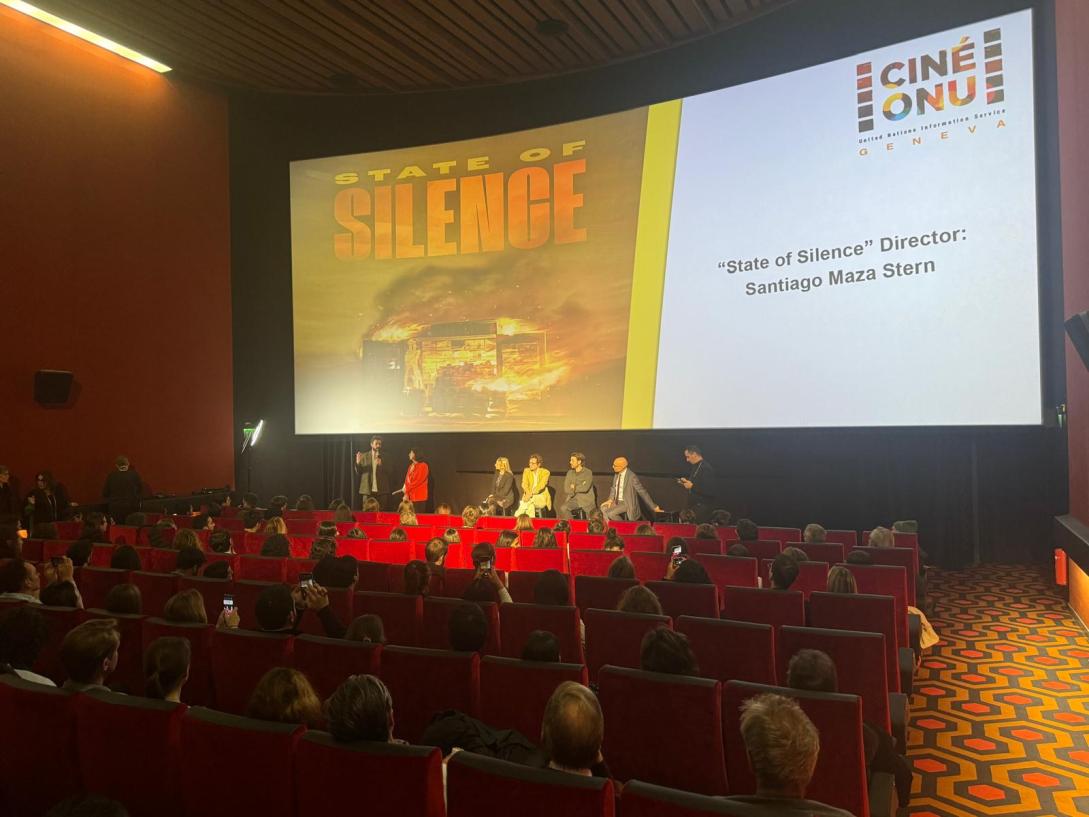Ciné-ONU Event Highlights Rising Attacks on Journalists and the Fight Against Impunity

This Ciné-ONU event took place in the context of the International Day to End Impunity for Crimes against Journalists. Marking its 10th anniversary this year on 2 November, the day serves as a reminder of the ongoing threats and violence faced by journalists worldwide and highlights the urgent need to combat impunity for crimes committed against them.
The unprecedented rise in killings of journalists over the last year is devastating and unacceptable. UNESCO’s 2024 Director-General’s Report on the Safety of Journalists and the Danger of Impunity reveals that killings of journalists rose 38% to 162 journalists killed between 2022 and 2023. This means that every four days, journalists are killed for seeking truth. At the same time, the impunity rate is unacceptably high with 85% of journalist killings remaining unpunished worldwide. And the few cases that are actually resolved take, on average, a long four years to reach that stage.
The documentary ‘State of Silence’ portrays four Mexican journalists who have become targets of repression in their pursuit to expose the pain and fear caused by two decades of unchecked violence from the so-called war on drugs. Like many of their colleagues, they are both victims and witnesses to the Narcopolitica system. Risking their lives to report on narco-trafficking and systemic corruption, they are often silenced for their unwavering commitment to uncovering the truth.
The screening was followed by a powerful panel discussion featuring Volker Türk, UN High Commissioner for Human Rights, Diego Luna, actor and executive producer, Santiago Maza Stern, filmmaker, Thibaut Bruttin, Director-General of Reporters Without Borders, and Gunilla von Hall, Swedish journalist for Svenska Dagbladet.
Filmmaker Santiago Maza Stern discussed the film's impact, noting that while people may know about the struggles journalists face, they rarely see the full extent of the dangers involved. His reflection highlights the often invisible risks that journalists encounter while working to expose the truth, especially in countries with high levels of violence and corruption.
Actor and executive producer Diego Luna stressed the urgency of supporting journalism in today's world, pointing out that press freedom is increasingly under threat. He underscored that journalism plays a vital role in safeguarding the public's right to information, emphasising the importance of fighting for press freedom globally.
“We have to celebrate journalism around the world today—more than ever. Freedom of press faces a big threat today. They need us.” Diego Luna
UN High Commissioner Volker Türk expressed solidarity with journalists, particularly those who risk their lives every day to report the truth. His support emphasised the right to truth and the role of journalists in ensuring that lies and misinformation are exposed. This reinforced the broader international responsibility to defend press freedom and protect those who work tirelessly to uphold it.
“There is a right to truth. We need to make lying wrong again. And journalists help us to do that.” Volker Türk, UN High Commissioner for Human Rights
The discussion also touched on the specific challenges faced by women journalists. Gunilla von Hall drew attention to the disproportionate harassment women experience, particularly on social media. She further referred to the urgent need to end impunity for crimes against journalists, pointing out that while providing protective gear for on-the-ground reporting offers some degree of safety, it remains only a temporary measure. She called for deeper, systemic reforms to tackle the underlying causes of violence against journalists.
Thibaut Bruttin from Reporters Without Borders also joined the conversation by highlighting that press freedom is not just about safety measures, but about fostering a social and political environment that actively defends these rights. He stressed that the film serves as a wake-up call, urging societies to better support and protect press freedom in all its forms.
EU Ambassador Lotte Knudsen initiated the Q&A session from the audience, emphasising the vital link between journalism and the right to truth. She voiced deep concern over the disproportionate targeting of women journalists, particularly through online harassment. Highlighting the gendered and sexualised nature of these attacks, she underscored the need for tailored protective measures to address the specific challenges faced by women in journalism.
“It’s you, it’s the journalists who bring the truth to people.” Lotte Knudsen, EU Ambassador to the UN in Geneva
The conversation was a powerful reminder of the crucial role journalism plays in holding power to account and the need for urgent action to protect journalists worldwide. The collective call for greater protection, respect, and recognition of press freedom underscores the ongoing fight against repression and censorship, and the necessity of defending the fundamental rights of journalists globally.
The EU strongly condemns attacks on journalists and calls for urgent and effective action to safeguard journalists and media workers. Violence against journalists, threats and harassment foster a climate of fear and self-censorship, even forcing an increasing number of journalists into exile. Without accountability, the cycle of violence against journalists will persist, further diminishing the space for free and independent media and undermining citizens’ right to information. International humanitarian law is clear: journalists and media workers are civilians and must be protected at all times. Deliberately targeting journalists is a war crime under international humanitarian law.
Read the Joint statement by the EU High Representative Josep Borrell and Vice-President Věra Jourová on the occasion of this year's International Day to End Impunity for Crimes against Journalists here.









